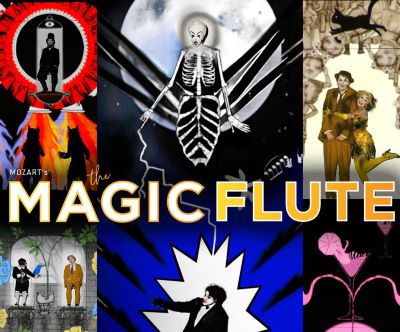AN ANIMATED FLUTE FANTASIA
This new-to-Chicago production of Mozart’s Magic Flute (Die Zauberflöte) is the most unique production this writer has seen in eight years of reviewing Lyric Opera! Revisionist, heavily animated and inspired by silent film, the production is more like the riskier fare one expects from Chicago Opera Theater. Originally debuted by Komische Oper Berlin in 2012, the production has been enjoyed by audiences around the world for nearly a decade. This revival production was co-produced by Los Angeles Opera and Minnesota Opera.
For audience members that remember Lyric’s most recent Magic Flute (2016-2017), this one is only slightly more grown-up, but just as family-friendly. It has at least two major advantages, however. The first is brevity: the opera is about twenty minutes shorter, leading to a total run time of two hours and forty minutes. This has been achieved not by cutting Mozart’s ever-delightful music, but by eliminating the spoken German dialogue and replacing it with the kind of descriptive statements one would find in a silent film. Replacing the spoken German with English makes so much sense that one wonders why more directors don’t do it. Secondly, the current production lacks the elaborate spinning set of the previous one. There is simply a white screen punctuated by multiple doors from which the characters sing and onto which the animations can be projected. Scene changes happen so smoothly and seamlessly that one would be hard-pressed to even identify them.
Lyric debut director Barrie Kosky of the Komische Oper Berlin co-created this production with Suzanne Andrade and Paul Barritt of 1927, a British company combining live performance and music with animation and film. The development process took three years and months of rehearsals–and it shows! A perfectly cohesive blend of music, animation and live performance, this Magic Flute truly lives up to its name. The masterful way that the actor-singers interact with the animations and vice versa is half the fun, especially the dragon scene at the outset. Perhaps the worst that could be said about the production design is that it could be much more colorful, especially the mostly monochromatic costumes. And the staging doesn’t leave much room for the chorus, who often sing from backstage.
As to the plot, The Magic Flute centers on the quest of a young prince named Tamino assisted by the birdcatcher Papageno (and his animated pet cat). After an encounter with the Queen of the Night (reimagined as a giant spider in this production), who gives Tamino a magic flute and Papageno magic bells, the two set off to find the queen’s daughter, Pamina, who has been captured by Sarastro and is guarded by his minion Monostatos. Yet, all is not as the Queen of the Night led them to believe. Tamino soon undergoes trials of silence, fire, and water in order to join Sarastro’s brotherhood and be united with Pamina. Papageno too finds love with his namesake Papagena in the opera’s happy, tidy ending.
Continuing the success of the season’s previous offering The Elixir of Love, The Magic Flute boasts a uniformly excellent cast, but one that draws more from abroad and includes more Lyric debuts. Channeling Buster Keaton, British baritone Huw Montague Rendall plays Papageno for oodles of laughs with his exaggerated movements, comic timing, and warm tone. His opening aria “Der Vogelfänger bin ich ja” and final duet “Pa-Pa-Pa-Pa-Pa-Pa-Pa-Papagena!” are full of fun and mirth. By contrast, Belarusian tenor Pavel Petrov plays Tamino with understated heroism and romance.
French soprano Lila Dufy, currently studying at Juilliard in NYC, displays a welcome lightness in her coloratura often absent in this role. Her two arias, especially the famous “Der Hölle Rache”, combine perfect pitch and dexterity with flawless technique. Chinese soprano Ying Fang, last seen as Zerlina in Mozart’s Don Giovanni two seasons ago, makes her welcome return as Pamina. She uses her lithe, clear voice to full a/effect in her emotional aria “Ach, ich fühl’s, es ist verschwunden”. In fact, all four of these singers use vibrato sparingly–and thankfully so.
Ryan Opera Center members Mathilda Edge, Katherine DeYoung, and Kathleen Felty blend their voices beautifully as the First, Second, and Third Ladies, respectively. And Denis Vélez, who is off to a phenomenal start this season, returns from her earlier successes in Macbeth and The Elixir of Love as Papagena. She is clearly an artist on the rise.
One last Lyric debut deserves mention: Chicago native Karen Kamensek as conductor. She is the first female conductor this reviewer can recall having seen on the Lyric podium. One wonders what she makes of Mozart’s sexism in The Magic Flute, which comes off somewhat ironically in this production. Not merely new-to-Chicago, but a new departure for the company, this Magic Flute is fresh, fun, and refulgent. Don’t miss it!

